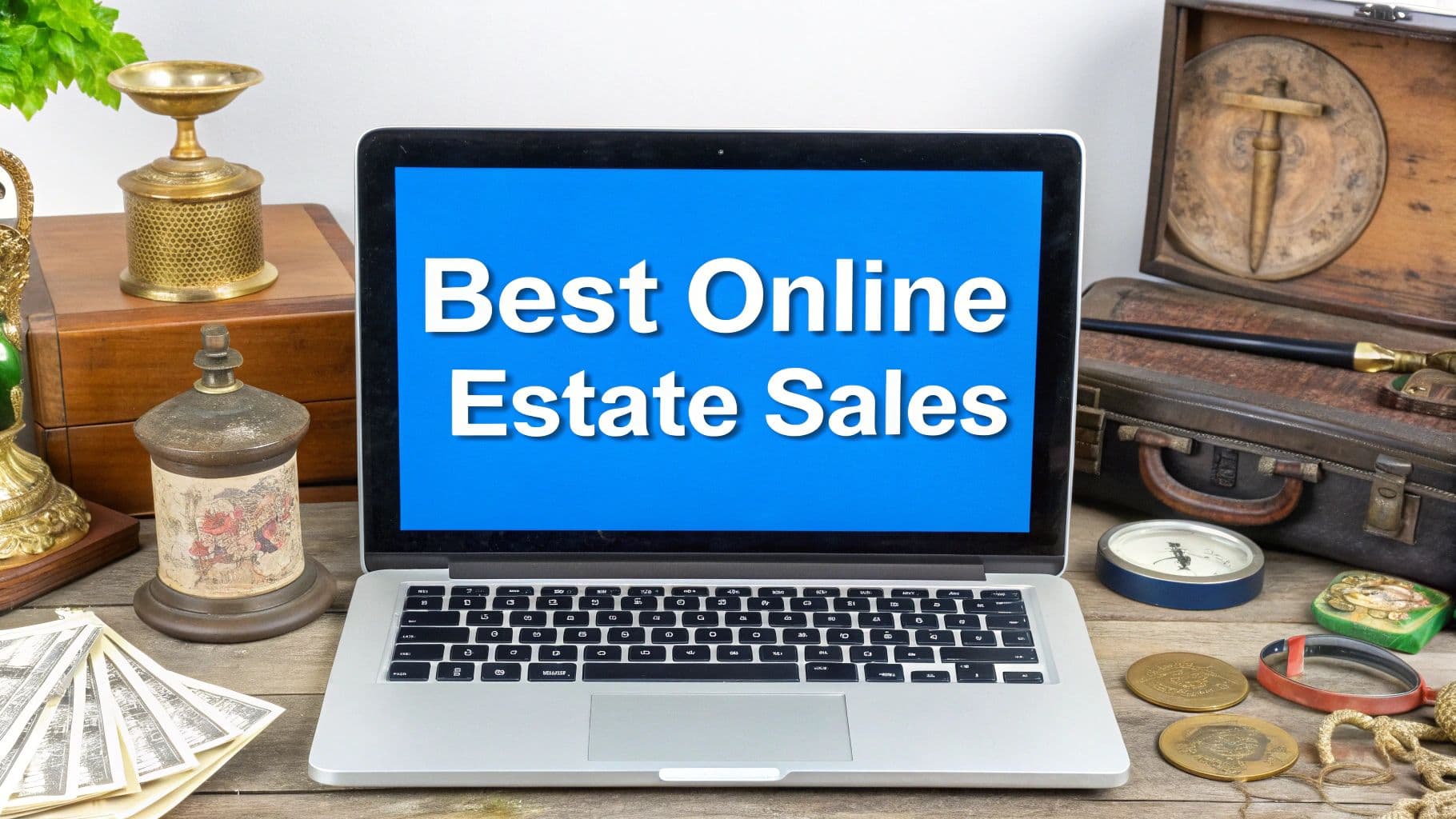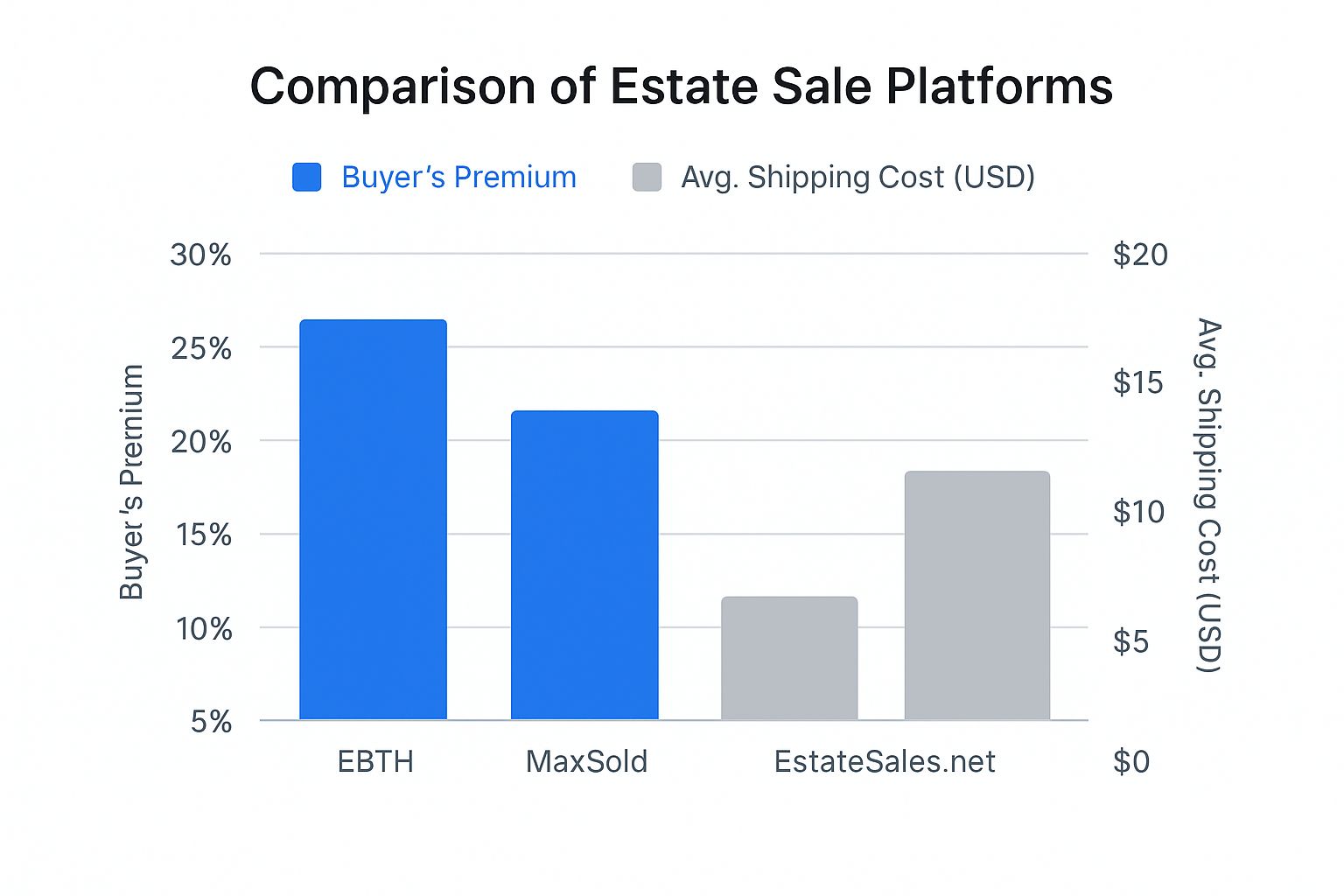Finding the Best Online Estate Sales for Treasures

If you're hunting for treasures online, you've probably realized that not all estate sale sites are created equal. The best platform for you really depends on what you're looking for. Are you after a high-end, authenticated piece with the convenience of nationwide shipping? Or is the thrill of a local, fast-paced bargain hunt more your style?
Two of the biggest names in the game, Everything But The House (EBTH) and MaxSold, offer completely different experiences. Think of EBTH as a curated, full-service auction house—perfect for finding quality items you can trust. On the other hand, MaxSold is all about speed and local pickup, making it a goldmine for savvy shoppers who can grab their winnings themselves.
A Modern Treasure Hunter's Guide to Online Estate Sales
Welcome to the digital treasure hunt! Estate sales have officially moved from front lawns to your laptop, creating a global marketplace for unique finds. Whether you're a serious collector, a decorator on a mission, or a reseller stocking up on inventory, this guide will help you navigate the top platforms.
This isn't just a niche hobby anymore; it's a full-blown industry. The global online auction market, which includes estate sales, was valued at a staggering $5.25 billion in 2023. And it's not slowing down. Projections show it could hit $11.3 billion by 2032, proving just how many people now prefer bidding from the couch. You can dig into more data on the online auction market's rapid expansion to see the full picture.
To get you started, here’s a quick look at our top picks.
Top Online Estate Sale Platforms At a Glance
This table gives you a quick snapshot of the leading platforms, what they do best, and who they’re for. Use it as a handy reference before we dive into the nitty-gritty details of each one.
| Platform | Primary Model | Best For |
|---|---|---|
| Everything But The House (EBTH) | Full-Service Managed Marketplace | Buyers seeking curated, authenticated items with reliable nationwide shipping. |
| MaxSold | Assisted Self-Service Auction | Local bargain hunters who prioritize speed and can handle item pickup. |
| EstateSales.net | Aggregator & Listing Directory | Shoppers wanting a comprehensive view of both online and in-person sales. |
After a quick look, it's clear each platform serves a very different kind of shopper.
The screenshot below gives you a feel for the clean, polished interface of Everything But The House (EBTH), a true leader in the curated online auction space.

This kind of professional layout, with its high-quality photos and easy-to-browse categories, is exactly why people trust EBTH. It’s designed to give you confidence, especially when you’re buying valuable items without seeing them in person first.
Key Insight: There is no single "best" platform. The right choice comes down to your personal priorities. It’s all about what matters most to you: guaranteed quality, shipping convenience, or the simple joy of snagging a great local deal.
A Look at the Different Online Estate Sale Models
Jumping into the world of online estate sales can feel like a lot at first. But once you get a feel for how the major players operate, it all starts to click. Think of it this way: there are a few different paths you can take, and each one is built for a specific type of buyer and seller.
Figuring out which one fits you best is the key to finding those amazing deals without the headache. The platforms out there mostly fall into one of three buckets. Let’s break them down.
Full-Service Managed Marketplaces
First up, you have the white-glove, all-inclusive option: the full-service managed marketplace. The big name here is Everything But The House (EBTH). These companies do literally everything.
From professional photography and writing detailed descriptions to cataloging, handling payments, and shipping—they manage the entire process. For you as a buyer, this means a trusted, almost retail-like experience. You can be confident that the items are well-vetted and accurately represented. You’re not just buying from some random person; you're buying through a professional service.
The Big Difference: What really sets this model apart is the end-to-end management. It gives buyers a consistent, high-quality presentation and, crucially, reliable nationwide shipping. This makes it the go-to choice for scoring valuable or fragile pieces from anywhere in the country.
This all-in-one approach has really shaken up the estate liquidation industry. The market for these services in the U.S. was on track to hit $230.3 million, and it's still growing. People want professional, trustworthy ways to handle liquidations, and these platforms deliver. You can dig into more estate sale industry growth statistics if you're curious.
Self-Service and Assisted Platforms
Next, we have the self-service and assisted platforms. These give sellers more control while still providing the auction tech. A great example is MaxSold, which is a master of rapid, local sales designed to clear out an entire home quickly.
The game here isn't about a curated national catalog; it's about high-volume local auctions. These sites are built for speed and efficiency, which usually means local pickup only. For a buyer, this is where you find the absolute bargains—if you live close enough to go get your items. The photos might not be as glossy as a full-service site, but the deals can be incredible.
Aggregator and Listing Sites
Finally, there are the aggregator and listing sites. These aren't marketplaces themselves but massive directories. EstateSales.net is the king of this category. It works like a specialized search engine for thousands of estate sale companies across the U.S.
This model gives you the broadest view of what's happening, covering both online auctions and traditional in-person sales. You can search for sales in your area, sign up for email alerts, and even keep an eye out for specific items you're hunting for.
Here’s a quick cheat sheet for how these models stack up for a buyer:
| Model Type | Primary Focus | Best For a Buyer Who... |
|---|---|---|
| Full-Service Managed | Quality & Convenience | Values authenticity, professional photos, and needs reliable shipping. |
| Self-Service/Assisted | Speed & Local Deals | Lives near the sale, can pick up items, and prioritizes low prices. |
| Aggregator/Listing | Comprehensive Discovery | Wants to see all available sales (online and offline) in their area. |
Knowing these basics makes all the difference. It helps you cut through the noise and zero in on the platforms that are truly the best fit for you.
A Detailed Comparison of Top Estate Sale Platforms
Picking the right online estate sale platform isn't just about browsing pretty pictures. The real difference comes down to the nitty-gritty details—the fees, the bidding rules, and how you actually get your items. These factors directly impact what you'll pay, your odds of winning, and whether the whole experience is a headache or a joy.
To really see which service is right for you, we have to look under the hood. Let's compare the biggest names side-by-side to see what truly makes them tick for a buyer.
Buyer's Premiums and Hidden Costs
The winning bid is almost never the final price you pay. The biggest extra cost is the buyer's premium, a percentage tacked onto your winning bid. This fee is how the auction company covers its costs, and it can seriously change your budget.
For example, a full-service platform like Everything But The House (EBTH) often has a higher premium, sometimes around 25%. This reflects their hands-on approach, including professional photography and detailed descriptions. On the other hand, a platform like MaxSold, which is all about fast, local sales, might have a premium closer to 20%. Aggregators like EstateSales.net don't set the premium themselves; the individual companies listing on their site do, with rates usually averaging around 15%.
Key Insight: Always factor the buyer's premium into your maximum bid. A $100 winning bid on EBTH becomes $125 before taxes and shipping, while the same bid on an EstateSales.net-listed auction might only be $115. This difference adds up quickly on higher-value items.
The infographic below shows how these fees and shipping costs play out across different platforms.

It’s a clear trade-off. Higher premiums often come with more comprehensive services, while local-pickup models cut out shipping costs entirely if you live nearby.
The Bidding Experience and Auction Styles
The thrill of the auction is all in the bidding. Different platforms use different closing rules, and that means you need different strategies. The two main types are soft close and hard close.
A soft close, used by sites like EBTH, is designed to prevent last-second "sniping." If someone places a bid in the final moments, the clock extends for a few more minutes. This gives everyone a fair chance to respond, just like in a live auction.
A hard close, in contrast, ends the auction at a specific time, period. This style rewards bidders who can time their final bid perfectly. Knowing which system is in use is absolutely critical to your bidding strategy. For a more detailed look, you can explore this overview of different online estate auction websites and their bidding mechanics.
Item Curation and Authenticity
How much can you trust an item's description? It really depends on the platform’s business model. This is where you see a huge difference in buyer confidence.
- Full-Service Curation (EBTH): On a managed site, every single item is handled, photographed, and described by the platform's own staff. This gives you consistency and a high level of trust, and they often provide basic authentication for valuable items.
- Assisted Seller Listings (MaxSold): Here, the original owner does more of the cataloging with the platform's guidance. It’s a model built for speed and volume, but it means the quality of descriptions can vary from one sale to the next.
- Independent Company Listings (EstateSales.net): This is an aggregator, so it hosts sales from thousands of different companies. The quality, accuracy, and expertise depend entirely on the individual company running the sale. You absolutely have to do your homework on the seller's reputation.
Shipping and Logistics: A Buyer's Perspective
Getting your winnings home is the last piece of the puzzle, and it can be the most frustrating. A platform's approach to logistics can be a deal-breaker.
Full-service platforms like EBTH shine here. They offer integrated, in-house shipping for most items, so you know the cost upfront and can handle it all at checkout. It's a smooth process that makes them a top choice for buyers who aren't local.
MaxSold is the complete opposite. Its entire business is built on local pickup. Shipping is rarely an option, and buyers are responsible for getting their items during a very specific, and often brief, pickup window. It’s perfect for local bargain hunters but a non-starter for anyone bidding from another state.
EstateSales.net is a mixed bag. Because every listing comes from a different company, shipping policies are all over the place. Some offer shipping, some make you hire a third-party shipper, and many are local pickup only. You must read the fine print on each sale before you bid.
Platform Feature and Fee Comparison
To make sense of it all, here’s a table breaking down the key differences between the major players. This at-a-glance view helps clarify which platform aligns best with your needs, whether you prioritize convenience, low fees, or access to local deals.
| Platform | Buyer's Premium | Seller Commission | Shipping Policy | Auction Format |
|---|---|---|---|---|
| Everything But The House (EBTH) | High (Avg. 25%) | Varies (Managed Service) | Integrated Nationwide | Soft Close |
| MaxSold | Moderate (Avg. 20%) | Varies (Managed Service) | Local Pickup Only | Hard Close |
| EstateSales.net (Listings) | Varies (Avg. 15%) | Varies by Company | Varies by Company | Varies by Company |
Ultimately, choosing the right platform means looking past the treasures and understanding the systems behind them. By weighing the fee structures, bidding rules, and shipping policies, you can bid smarter, avoid surprises, and increase your chances of scoring that perfect find.
Which Online Estate Sale Platform Is Right for You?

Choosing the "best" online estate sale site is a lot like picking the right tool for a job—the best one depends entirely on what you're trying to accomplish. Your goals, your budget, and how much hands-on effort you want to put in will point you to the perfect fit.
The platform a casual weekend browser loves might be a terrible match for a serious collector hunting for authenticated artifacts. To skip the frustration, it pays to know your own buying style first. We've broken it down by three common buyer profiles to help you find the right marketplace.
For the Casual Treasure Hunter
Do you love the thrill of the hunt but aren't necessarily looking for a specific high-dollar piece? You’re the type who enjoys scrolling through everything from vintage kitchenware to quirky art, hoping a unique and affordable gem catches your eye.
If that sounds like you, you need a platform with a massive, varied inventory that doesn't feel intimidating.
- Top Recommendation: Start with an aggregator like EstateSales.net. It acts as a giant directory, giving you the widest possible view of sales happening online and in your local area from hundreds of different companies.
- Key Feature: The "Treasure Tracker" function is your best friend. You can set alerts for broad categories like "mid-century furniture" or "costume jewelry" and get an email when sales list items that fit your interests.
Situational Insight: This approach is all about low pressure and high reward. You’ll sift through a lot of everyday stuff, but the sheer volume dramatically increases your odds of stumbling upon a fantastic deal without being locked into one company's ecosystem.
For the Serious Collector
You're operating on a different level. You aren't just browsing; you're on a mission for specific, often valuable items. For you, authenticity, provenance, and condition are everything, and you're willing to pay a premium for quality and confidence.
Trust is your most important currency. You need a platform that vets its inventory and provides professional, detailed information.
- Top Recommendation: A full-service, managed marketplace like Everything But The House (EBTH) was practically built for you. Their model uses in-house experts to catalog, photograph, and often authenticate items, which massively reduces the risk of buying a fake or misrepresented piece.
- Why It Works: Yes, the buyer's premium is higher. But you're paying for that crucial layer of verification and a consistent, professional experience. This is non-negotiable when you're bidding on fine art, rare antiques, or designer goods. For more on this, see our guide on the https://www.diyauctions.com/learn/best-auction-sites-for-collectibles.
This targeted strategy means you can spend your time evaluating verified items instead of second-guessing the legitimacy of a listing.
For the Local Bargain Seeker
Your main goal is simple: find incredible deals. You don't mind a little legwork, shipping costs are your nemesis, and you thrive on the fast-paced, competitive energy of local clear-outs. You're ready and willing to pick up your winnings in person.
For you, the best online sales are the ones happening right down the street.
- Top Recommendation: Platforms like MaxSold are your playground. Their entire business is built around rapid, local-only auctions where nearly everything has to be picked up in person during a very short, specific time window.
- Strategic Advantage: The local-pickup-only rule is a game-changer. It automatically weeds out the national competition, meaning you're only bidding against other people who can physically get to the location. This almost always results in much lower final prices.
This method requires a bit more logistical planning on your end, but it consistently delivers the best bang for your buck. Modern estate sale companies are getting smarter, too, using digital marketing to amplify their local sales and tap into the growing demand for convenient, online-first transactions that still end with a local pickup.
Ultimately, matching your personal style to the right platform is the real secret to success. Once you know what you want, you can find the perfect place to unearth your next great find.
Proven Strategies for Winning Bids and Finding Gems

There’s more to winning at online estate sales than just having a good eye. It takes a smart strategy. The real winners—the ones who consistently snag the best items—are masters of preparation, timing, and understanding how each auction works.
If you develop a solid approach, you’ll not only win more often but also avoid the trap of overpaying in a last-minute bidding war. The groundwork for a great buy is laid long before you ever place a bid.
Master the Art of Pre-Bid Research
Your best defense against a bad buy is digging into the listing. Scrutinize every photo, zooming in to find maker's marks, signatures, or subtle damage like a hairline crack on a vase or a repaired leg on a table. If the photos aren't clear, don't be shy—ask the auction company for more.
Read the item description like a detective. Keep an eye out for keywords that tell a story about the condition, such as "as-is," "untested," or "age-related wear." A good description offers vital clues about an item's history and authenticity.
Pro Tip: Use an image search tool to cross-reference the item with known examples online. This is a quick way to spot fakes, identify reproductions, and get a realistic feel for its market value.
This kind of deep dive is a fundamental skill for anyone serious about online estate auctions. It’s what allows you to bid with confidence, not just hope.
Crafting a Winning Bidding Strategy
With your research done, it's time to decide how to play the game. The two main tactics are setting a maximum bid ahead of time or "sniping" in the final seconds. Each has its place, and the right choice depends on the platform's rules and your own style.
- Setting a Maximum Bid: This is the "set it and forget it" method. You enter the absolute highest price you’re willing to pay, and the platform’s software automatically bids for you in small increments up to your limit. It's perfect for auctions you can't monitor live and keeps emotional, in-the-moment overbidding in check.
- Last-Second Sniping: This is exactly what it sounds like—placing your bid in the final moments of the auction. It’s a killer strategy on platforms with a hard close, where the clock stops at a specific time no matter what. But it's a risky move on sites with a soft close, since a last-second bid just extends the timer.
Before you choose, know the rules. A soft close benefits determined bidders who can stick around, while a hard close rewards sharp timing and a little bit of nerve.
Calculating Your True Final Cost
Your winning bid is rarely your final price. One of the biggest mistakes new buyers make is forgetting about the extra fees. Always calculate your "all-in" cost before you even think about bidding.
First, look for the buyer's premium—a percentage fee added to your winning bid. A 20% premium on a $100 item immediately bumps your cost to $120. Next, add in any sales tax.
Finally, figure out shipping and handling. For bulky or fragile items, this can be a huge expense. If the cost isn't listed, contact the auction house for a shipping quote before you bid.
Once you’ve won your treasures, getting them home safely is the final step. For fragile items, using efficient packing strategies is key. By adding up all these costs—bid, premium, tax, and shipping—you’ll know your true total investment and avoid any nasty surprises.
So, What's the Verdict on the Best Online Estate Sales?
After digging into the details, it’s clear there’s no single "best" platform—it all comes down to what you're looking for. The right choice depends entirely on your goals, whether that's convenience, bargain hunting, or finding something truly special.
If you want a curated, hands-off experience with reliable nationwide shipping, EBTH is tough to beat. Their full-service model means they handle the professional photography, write detailed descriptions, and even coordinate the shipping. It gives you a ton of confidence that what you see is what you’ll get, without having to worry about local pickup logistics.
On the flip side, MaxSold is the undisputed champ for local bargain hunters who want to avoid high overhead. Because their auctions are strictly for local pickup, the final bids can often be up to 20% lower once you factor in the fees. Sellers love it, too—the one-day pickup event makes clearing out a property incredibly efficient.
Which Platform Is Right for You?
Let’s break it down by what kind of buyer you are:
- For Casual Treasure Hunters: You love variety and don't want to get bogged down by high fees. The directory-style approach of EstateSales.net is perfect for getting a steady stream of local sales sent right to your inbox.
- For Serious Collectors: You need authenticated, high-value items and can't risk a dud. EBTH's expert vetting and focus on quality make it the go-to choice.
- For Local Bargain Seekers: Your main goal is scoring the best possible deal with minimal fees. MaxSold’s fast-paced, local-only auctions are where you'll find unbeatable prices.
“Choosing the right platform is about matching your needs to its strengths.”
Ultimately, your best bet hinges on what you value most. Is it convenience over cost? Are you hunting for specific, high-end pieces or just looking for a good deal? Answering those questions will point you in the right direction.
What's Next for Online Estate Sales?
The industry isn't standing still. A few key shifts on the horizon are set to make the entire experience better for both buyers and sellers.
Keep an eye out for these game-changers:
- AI-powered appraisals that will give you real-time valuations as items are listed.
- Eco-friendly shipping options, like sustainable packing materials and carbon offsets.
- Blockchain-based records to track an item’s history, which will boost trust and help prevent fraud.
These trends are all about bringing more transparency, efficiency, and ethical practices to the table. With this verdict in hand, you can now confidently pick the best online estate sales platform that truly fits your style.
Happy bidding
Common Questions About Online Estate Sales
If you're new to the world of online estate auctions, you probably have a few questions. That's completely normal. Understanding the little details—from bidding to pickup—is the key to confidently finding those amazing treasures.
Let's walk through some of the most common questions buyers ask.
How Does Shipping Work, and What Will It Cost?
Shipping costs can be the biggest wildcard in any online auction. There's really no single answer, as it all comes down to the individual sale and the platform's business model.
On full-service sites, the platform usually handles the shipping for you. They’ll calculate the cost at checkout based on the item’s size, weight, your location, and the packing needed to get it there safely. But for sales run by independent companies on aggregator sites, you'll need to check their specific terms. Some handle it in-house, while others might require you to hire a third-party service for large items like furniture.
Expert Tip: Always check the shipping policy for an auction before you even think about bidding. A fantastic deal on a heavy antique dresser can lose its appeal fast once you add a few hundred dollars in freight charges.
What Is a Buyer's Premium?
A buyer’s premium is simply a fee added to your final bid amount. Think of it as a service charge that helps the auction company cover the costs of running the sale—things like photography, marketing, and managing the whole event.
This fee has a direct impact on what you actually pay. For example, if you win an item with a $100 bid and the buyer’s premium is 20%, your bill will be $120 before any taxes or shipping costs are added. It’s essential to factor this percentage into your maximum bid to avoid any surprises.
Can I Return Something I Win?
In almost all cases, the answer is no. Items at an online estate sale are sold "as-is, where-is," which is industry speak for "all sales are final."
You’re buying second-hand goods, so some level of age and wear is part of the territory. Returns are typically only considered if an item was completely misrepresented in the listing. This is why it’s so important to scrutinize every photo and read the description carefully before you commit. Once you win, it's yours.
How Can I Spot an Authentic Item from Just Photos?
Learning to verify authenticity from a screen takes a bit of practice, but you can train your eye to spot the right details. Here's what to focus on:
- Hunt for marks and signatures. Zoom in on the bottoms of vases, the backs of paintings, or the inside of furniture drawers.
- Study the construction. Does the wood grain look right for the era? Are the screws or nails modern or period-appropriate? Real antiques have clues in how they were made.
- Compare it to known examples. Use Google Images, collector forums, and museum archives to see how your potential find stacks up against confirmed authentic pieces.
If you’re ever in doubt, it’s always safer to bid on platforms where experts have already vetted the items.